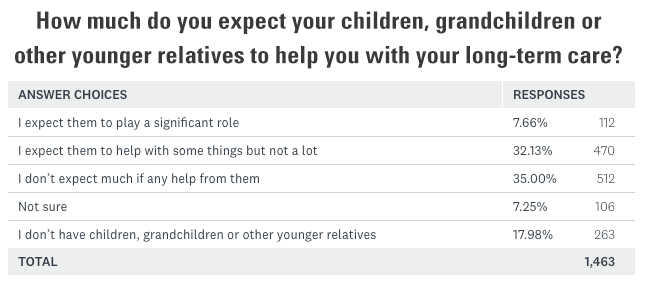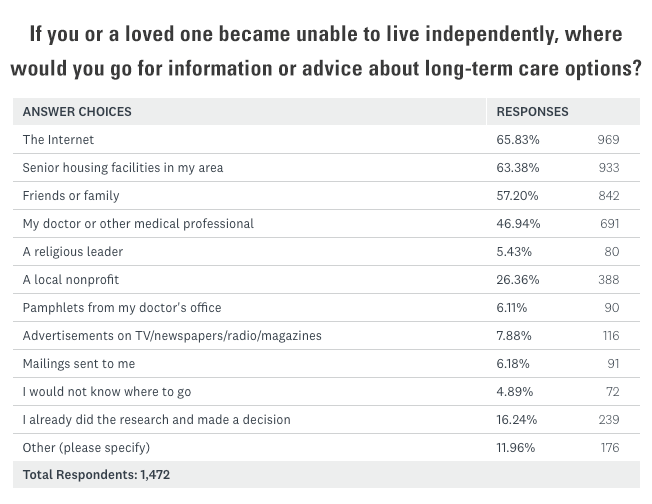What Do You Want for Long-Term Care?
Readers told us about their hopes and how they get information
When we have good health, we tend to think little about losing it. It’s easier and more pleasant to imagine that we will live an active and happy life until the moment we collapse of a heart attack on a sunny Florida golf course.

But that’s not the norm.
Getting older doesn’t automatically mean we will become dependent on others. However, “As people age, they are increasingly likely to develop a physical or cognitive impairment that impacts their ability to function independently,” according to a 2016 report by the National Academies of Sciences, Engineering, and Medicine.
So, in a recent survey about long-term care, Next Avenue asked readers to tell us how likely they think they will need help as they age. We asked additional questions about what they would want for care and how they would find information about long-term care options.
We’ll Need More Help Than We Think
Of the nearly 1,500 who responded, less than 8 percent said they expected their children, grandchildren or other younger relatives would play “a significant role” in their long-term care. Thirty-two percent said they expected those relatives to help with some things, but not a lot. And 35 percent said they don’t expect much if any help from children, grandchildren or other younger relatives.
But in reality, seven in 10 of us will need help if we live to at least 65, according to The SCAN Foundation. And we’ll need it for at least three years.
In the last five decades, “we’ve added many years of life at a pretty high level of quality, but with more chronic illnesses and functional limitations,” said Dr. Bruce Chernof, president and CEO of The SCAN Foundation at the 2017 Aspen Ideas Festival.
The vast majority of the care we’ll receive will come from an unpaid family member.

Where We Look for Information
Other questions in the survey asked readers where they would look for information if they get to the point of needing long-term care.
Most respondents (66 percent) said they would get their information about long-term care options on the Internet, senior housing facilities in their area (63 percent) or from family or friends (57 percent).

Sometimes it’s difficult to know whether the information about long-term care options is trustworthy. A number of readers specified that they have visited facilities in person or had experience with them through another loved one. Some said they checked with friends and neighbors to verify information they received elsewhere.
What We Would Want (If We Have the Choice)
What do we want from the places where we might live to receive long-term care?
After “consistent, caring staff” (92 percent) privacy (87 percent) was the characteristic most often cited as “very important” when choosing a facility for themselves. Transportation (77 percent), meal choices (71 percent) and choice of customizing your room or apartment (60 percent) rounded out the top five things regarded as “very important” by respondents.
The ability to keep a pet was cited as very important by 45 percent of respondents, and as somewhat important by 14 percent.
Additional Comments Reveal Dreams, Desires, Fears
Here are some of the comments readers added at the end of our survey regarding their future long-term care. They are some of the most illuminating results:
On what they want for long-term care:
- Transportation is very important. I would like transportation to be available to places I want to go when I want to go, not always with a group. I would particularly like to have transportation for medical appointments and to concerts and the theater, to which I have season tickets.
- Facility needs to be very clean and smell good
- LGBT accepting and embracing
- I don't want to feel like I'm in prison. I value my freedom to do what I want when I want.
- There is a paucity of CCRCs [continuing care retirement communities] in my area, and the ones that do exist are laid out and decorated as if they were trying to appeal to my parents' era, not mine and my husband's. They need to seriously update and modernize their image…. The baby boomers are coming, and they're different from previous generations. They want something better, something more, than what's out there now.
- Flexibility to get as much, or as little, assistance as I want or need. I find that many facilities have rigid requirements which do not fit my situation.
- I'm a vegetarian used to eating good organic food, often "ethnic" food. The meals in my parents' facility were nothing I'd eat, except salad. It was tasteless, meat-centered, high salt and not at all healthy. I would not be able to subsist on it.
- I've heard about, and am interested in, a "homelike" setting such as the Green House Project.
- My perfect community would consist of residents of all ages, from babies to great great grandparents.
On long-term care affordability and other concerns:
- There are lots of upscale facilities but not much that is moderately priced.
- I am very concerned over expenses, security, abuse and attempts of these large companies to take advantage of patient rights. I’m also concerned at the level of vetting and training of employees. As a single person who doesn’t have family, who will advocate for me?
- I can't afford assisted living, so plan to move into an apartment. If Congress cuts Social Security and Medicare, I will be unable to manage.
- My husband and I have absolutely no way of paying for any kind of elder care. We are living hand to mouth every month on fixed pensions…. There are only traditional nursing homes where we live. I would rather die than live in one of those places.
On getting information about long-term care:
- Use a local placement and referral service who will give personalized service for your particular needs and desires. Don't use a large national company who is not familiar with your geographic area and has often not even visited the communities they recommend.
- I have worked in the field of senior services and know that unbiased information is hard to find!


